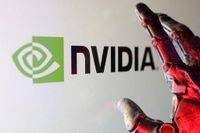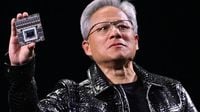Nvidia announced on April 15, 2025, that it would incur $5.5 billion in charges following new U.S. government restrictions on the export of its H20 artificial intelligence chip to China, a significant market for the company. The announcement sent Nvidia's shares tumbling approximately 6% in after-hours trading.
The H20 chip is currently Nvidia's most advanced offering available in China and plays a crucial role in the company's strategy to maintain a foothold in the rapidly growing Chinese AI industry. Companies such as Tencent, Alibaba, and ByteDance, the parent company of TikTok, have been increasing their orders for H20 chips, driven by surging demand for affordable AI models from the startup DeepSeek, as reported by Reuters in February.
While the H20 chip does not match the speed of Nvidia's chips available outside of China for training AI models, it remains competitive in the inference stage, where AI models provide answers to users. Inference is emerging as a vital component of the AI chip market, and Nvidia CEO Jensen Huang asserted last month that the company is well-positioned to lead in this area.
However, the U.S. government has decided to restrict H20 chip sales to China due to concerns that the chips might be utilized in supercomputers. Although the H20 chip has lower computational capabilities than Nvidia's other offerings, its capacity for high-speed connections to memory and other computing chips raises alarm about its potential use in supercomputers. Since 2022, the U.S. has imposed restrictions on the sale of chips intended for supercomputers in China.
The Institute for Progress, a nonpartisan think tank based in Washington, D.C., supported the U.S. government's decision to restrict H20 chips. They indicated that Chinese firms were likely already constructing supercomputers using these chips. "At least one of the buyers, Tencent, has already installed H20s in a facility used to train a large model, very likely in breach of existing controls restricting the usage of chips in supercomputers exceeding certain thresholds. DeepSeek’s supercomputer used to train their V3 model is also likely in breach of the same restrictions," the group stated.
Nvidia revealed that it received notification from the U.S. government on April 9 that the H20 chip would require a license for export to China. On April 14, the government informed Nvidia that these restrictions would be enforced indefinitely. The company has not disclosed how many export licenses it might receive.
In a broader context, Nvidia also announced that it had begun producing chips at factories in Arizona and would construct supercomputers in Texas, marking a significant shift in the manufacturing of essential processing hardware for generative AI back to the United States. This development comes amid ongoing concerns regarding tariffs imposed by former President Donald Trump, which have caused anxiety about the cost of importing technology and products traditionally made overseas.
Most of the tariffs announced in April 2025 have been placed on hold following a major decline in the stock market, and the Trump administration exempted certain electronics, including phones and computers, from specific tariffs over the weekend. Trump hinted on his social media platform, Truth Social, that his administration would be reviewing semiconductor tariffs and the electronics supply chain, indicating potential changes ahead.
Nvidia's Blackwell chips are being produced at TSMC chip plants in Phoenix, while the supercomputers designed for AI-focused data centers will be built in Houston in partnership with Foxconn and in Dallas with Wistron. The company anticipates ramping up manufacturing at these supercomputer plants over the next year.
CEO Jensen Huang emphasized the significance of this move, stating, "The engines of the world's AI infrastructure are being built in the United States for the first time. Adding American manufacturing helps us better meet the incredible and growing demand for AI chips and supercomputers, strengthens our supply chain, and boosts our resiliency."
Moreover, Nvidia is not alone in this shift; AMD has also announced plans to begin producing processors at TSMC's Arizona facility. The push to bring semiconductor manufacturing back to the U.S. has gained momentum in recent years, particularly following the signing of the CHIPS Act by President Joe Biden in 2022, which allocated $53 billion to incentivize chipmakers to relocate production to the states.
This transition to U.S.-based production is a long-term endeavor, as building fabrication facilities, or "fabs," requires substantial investment and time. Anne Hoecker, head of the global technology practice for Bain & Company, noted that while tariffs are influencing the industry, the trend towards a more resilient semiconductor supply chain has been developing across multiple administrations.
"The tariffs are moving, and they're having a big impact, but there is a long-term trend here for a resilient semiconductor supply chain that has gone through multiple administrations," Hoecker stated. She also pointed out that while onshoring some semiconductor manufacturing could lead to higher costs, it ultimately reduces risks associated with having a significant portion of the industry concentrated in Taiwan.
As the landscape of AI technology continues to evolve, consumers may not directly purchase chips for training and running their own generative AI models, but the costs associated with hardware will undoubtedly influence the pricing of the services they rely on. With AI increasingly integrated into devices like smartphones and software applications, any rise in production costs could result in significant ripple effects throughout the market.
In summary, Nvidia's recent announcements highlight the complex interplay of U.S. export controls, the evolving semiconductor landscape, and the growing demand for AI technologies. As the company navigates these challenges, its commitment to domestic manufacturing and innovation will be crucial in shaping the future of AI infrastructure.






